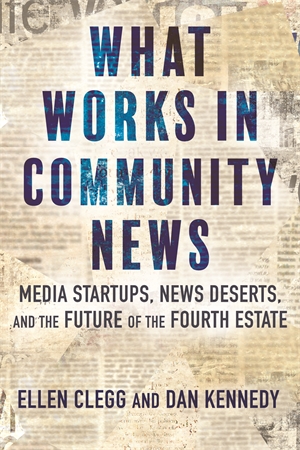
Recently Max Tani of Semafor and Richard J. Tofel, who writes the newsletter Second Rough Draft, have raised questions about whether the folks involved in the purchase of the Portland Press Herald and its affiliated Maine papers from the retiring publisher, Reade Brower, have been sufficiently transparent in disclosing who the funders are.
The papers were bought during the summer by the National Trust for Local News, a nonprofit that has been involved in several acquisitions aimed at preventing legacy newspapers from falling into the hands of corporate chain ownership. In Maine, Tani and Tofel argue, the billionaire George Soros may have been more deeply involved than was previously known, while the involvement of another billionaire who was reportedly part of the purchase, Hansjörg Wyss, hasn’t been disclosed at all.
I’m going to go out on a limb and say that this is essentially a non-issue. Tofel himself notes that the previous management of the papers remains in place and that “invocations of Soros as a sort of bogeyman have long since become a principal way to dog whistle anti-Semitism; it ranks right up there with ‘globalist’ in this rhetoric.”
More to the point, the Press Herald itself followed up on Tani’s reporting, and it sounds like the full story behind the purchase will be revealed soon. (I was interviewed for the piece, written by reporter Rachel Ohm.) Longtime Press Herald publisher Lisa DeSisto, now the CEO and publisher of the Maine Trust for Local News, the nonprofit that has been set up to own the papers, is quoted as saying, “We want to make more of a splash and have a more comprehensive introduction to the Maine Trust rather than just [putting things out in] pieces. We’re really waiting to announce a broader vision.”
Added Will Nelligan, who’s the Maine project lead for the National Trust: “We will announce that coalition of Maine funders when we announce the Maine Trust.”
No, the announcement didn’t come in September, as had been originally promised. But is that really a big deal as long as disclosure is on its way? The papers themselves, by the way, remain for-profit entities, so it seems unlikely that either the National Trust or the Maine Trust will be looking for ongoing support to prop them up.
If you take a look at the National Trust’s funders, you’ll see that, in addition to Soros’ Open Society Foundations, they include a number of respected journalism funders, including the Knight Foundation, the MacArthur Foundation, the Democracy Fund and the Lenfest Institute, which owns The Philadelphia Inquirer. The Gates Family Foundation, by the way, is a Colorado-based philanthropy that has nothing to do with Bill or Melinda Gates.
When I asked University of Maine journalism professor Michael Socolow to weigh in, he emailed me comments he had previously posted on X/Twitter, noting that Tani and Tofel had emphasized Soros’ and Wyss’ liberal politics but adding they had been unable to back up whether that was relevant. (To be fair, Tofel seemed less impressed with that angle than Tani.) Socolow said:
I’m not sure there’s a story here. Neither Tani nor Tofel specify the ways the new ownership has altered editorial content. They’re seemingly insinuating that the new ownership purchased the newspapers to shape news content for partisan political reasons. But how much disclosure and transparency about Reade Brower and his business interests did these publications publish before the sale? It’s not clear to me why there needs to be a new, and apparently higher, standard simply because the ownership is now non-profit versus commercial. If evidence emerges that the sort of meddling Tani and Tofel insinuate begins occurring, then I agree we have an important story. But we’re not there yet.
Let me end with a couple of disclosures: Ellen Clegg and I interviewed National Trust co-founder and CEO Elizabeth Hansen Shapiro on our podcast, “What Works: The Future of Local News,” and we wrote about the National Trust’s successful effort to save two dozen community newspapers in the Denver suburbs in our forthcoming book, “What Works in Community News.” I worked with DeSisto at The Boston Phoenix and Ellen later got to know her at The Boston Globe, and we both consider her to be a first-rate, ethical news executive.
The purchase of the Press Herald papers by the National Trust was unalloyed good news, and it sounds like the questions that Tani and Tofel have raised will be answered soon.
Leave a comment | Read comments

 Ellen Clegg and I are thrilled to go public today with our book,
Ellen Clegg and I are thrilled to go public today with our book, 


